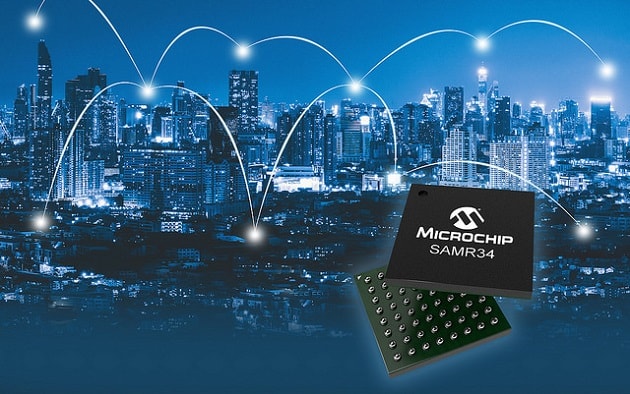LoRa (Long Range) technology is extending the reach of the Internet of Things (IoT) by combining long-range wireless connectivity with low-power performance. To accelerate the development of LoRa-based connected solutions, Microchip Technology Inc. has introduced a highly integrated LoRa System-in-Package (SiP) family with an ultra-low-power 32-bit microcontroller (MCU), sub-GHz RF LoRa transceiver and software stack. The SAM R34/35 SiPs come with certified reference designs and proven interoperability with major LoRaWAN gateway and network providers, significantly simplifying the entire development process with hardware, software and support. The devices also provide the industry’s lowest power consumption in sleep modes, offering extended battery life in remote IoT nodes.
Most LoRa end devices remain in sleep mode for extended periods of time, only waking up occasionally to transmit small data packets. Powered by the ultra-low-power SAM L21 Arm Cortex-M0+ based MCU, the SAM R34 devices provide sleep modes as low as 790 nA to significantly reduce power consumption and extend battery life in end applications. Highly integrated in a compact 6 x 6 mm package, the SAM R34/35 family is ideal for a broad array of long-range, low-power IoT applications that require small form factor designs and multiple years of battery life.
In addition to ultra-low-power consumption, the simplified development process means developers can accelerate their designs by combining their application code with Microchip’s LoRaWAN stack and quickly prototype with the ATSAMR34-XPRO development board (DM320111), which is supported by the Atmel Studio 7 Software Development Kit (SDK). The development board is certified with the Federal Communications Commission (FCC), Industry Canada (IC) and Radio Equipment Directive (RED), providing developers with the confidence that their designs will meet government requirements across geographies.
LoRa technology is designed to enable low-power applications to communicate over longer ranges than Zigbee, Wi-Fi and Bluetooth using the LoRaWAN open protocol. Ideal for a range of applications such as smart cities, agricultural monitoring and supply chain tracking, LoRaWAN enables the creation of flexible IoT networks that can operate in both urban and rural environments. According to the LoRa Alliance, the number of LoRaWAN operators has doubled from 40 to 80 over the last 12 months, with more than 100 countries actively developing LoRaWAN networks.
“The LoRa ecosystem is entering a phase of accelerated growth, and as a founding member of the LoRa Alliance, Microchip has been a strong driving force to build the success of this technology,” said Steve Caldwell, vice president of Microchip’s Wireless Solutions business unit. “The SAM R34 continues Microchip’s reputation as a one-stop shop for small, low-power devices that bring the benefits of free software, excellent customer support and dependable supply.”
The SAM R34/35 family is supported by Microchip’s LoRaWAN stack, as well as a certified and proven chip-down package that enables customers to accelerate the design of RF applications with reduced risk. With support for worldwide LoRaWAN operation from 862 to 1020 MHz, developers can use a single part variant across geographies, simplifying the design process and reducing inventory burden. The SAM R34/35 family supports Class A and Class C end devices as well as proprietary point-to-point connections.
Availability
Microchip’s SAM R34/35 LoRa family is available in six device variants, providing developers the flexibility to choose the best combination of memory and peripherals for their end application. These include SAM R34 devices in a 64-lead TFBGA package and SAM R35 devices without a USB interface.








